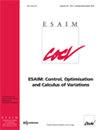非线性控制系统的组合算子连续反馈镇定
IF 1.2
3区 数学
Q4 AUTOMATION & CONTROL SYSTEMS
Esaim-Control Optimisation and Calculus of Variations
Pub Date : 2022-03-31
DOI:10.1051/cocv/2022022
引用次数: 2
摘要
通过使用连续反馈来渐近稳定控制系统的能力是控制理论和应用的一个重要课题。在本文中,我们使用一种不涉及控制李雅普诺夫函数的新方法提供了连续反馈稳定性的完整表征。为了做到这一点,我们首先使用组合算子对反馈稳定性进行了轻微的推广,并在此扩展设置中描述了连续稳定性。在更一般的情况下,利用得到的刻画,我们建立了常规意义上的连续稳定和广义复合算子意义上的连续稳定之间的关系。这种联系使我们能够证明,控制系统的连续稳定性等同于由诱导控制系统的矢量场的局部部分形成的关联系统的稳定性。也就是说,我们把连续稳定问题简化为稳定问题。此外,我们还提供了一个描述给定系统所有可能的连续稳定反馈的通用公式。本文章由计算机程序翻译,如有差异,请以英文原文为准。
Continuous feedback stabilization of nonlinear control systems by composition operators
The ability to asymptotically stabilize control systems through the use of continuous feedbacks is an important topic of control theory and applications. In this paper, we provide a complete characterization of continuous feedback stabilizability using a new approach that does not involve control Lyapunov functions. To do so, we first develop a slight generalization of feedback stabilization using composition operators and characterize continuous stabilizability in this expanded setting. Employing the obtained characterizations in the more general context, we establish relationships between continuous stabilizability in the conventional sense and in the generalized composition operator sense. This connection allows us to show that the continuous stabilizability of a control system is equivalent to the stability of an associated system formed from a local section of the vector field inducing the control system. That is, we reduce the question of continuous stabilizability to that of stability. Moreover, we provide a universal formula describing all possible continuous stabilizing feedbacks for a given system.
求助全文
通过发布文献求助,成功后即可免费获取论文全文。
去求助
来源期刊

Esaim-Control Optimisation and Calculus of Variations
Mathematics-Computational Mathematics
自引率
7.10%
发文量
77
期刊介绍:
ESAIM: COCV strives to publish rapidly and efficiently papers and surveys in the areas of Control, Optimisation and Calculus of Variations.
Articles may be theoretical, computational, or both, and they will cover contemporary subjects with impact in forefront technology, biosciences, materials science, computer vision, continuum physics, decision sciences and other allied disciplines.
Targeted topics include:
in control: modeling, controllability, optimal control, stabilization, control design, hybrid control, robustness analysis, numerical and computational methods for control, stochastic or deterministic, continuous or discrete control systems, finite-dimensional or infinite-dimensional control systems, geometric control, quantum control, game theory;
in optimisation: mathematical programming, large scale systems, stochastic optimisation, combinatorial optimisation, shape optimisation, convex or nonsmooth optimisation, inverse problems, interior point methods, duality methods, numerical methods, convergence and complexity, global optimisation, optimisation and dynamical systems, optimal transport, machine learning, image or signal analysis;
in calculus of variations: variational methods for differential equations and Hamiltonian systems, variational inequalities; semicontinuity and convergence, existence and regularity of minimizers and critical points of functionals, relaxation; geometric problems and the use and development of geometric measure theory tools; problems involving randomness; viscosity solutions; numerical methods; homogenization, multiscale and singular perturbation problems.
 求助内容:
求助内容: 应助结果提醒方式:
应助结果提醒方式:


